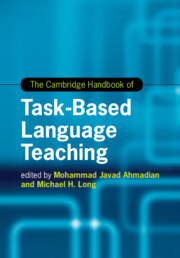Book contents
- The Cambridge Handbook of Task-Based Language Teaching
- Cambridge Handbooks In Language And Linguistics
- The Cambridge Handbook of Task-Based Language Teaching
- Copyright page
- Dedication
- Contents
- Figures
- Tables
- Contributors
- Preface The Origins and Growth of Task-Based Language Teaching
- Part I The Rationale for Task-Based Language Teaching
- Part II Tasks and Needs Analysis
- Part III The Task Syllabus and Materials
- Part IV Methodology and Pedagogy
- Part V Task-Based Language Teaching with School-Age Children
- Part VI The Teacher in Task-Based Language Teaching
- Part VII Task-Based Assessment and Program Evaluation
- Part VIII Research Needs and Future Prospects
- 15 Methodological Approaches to Investigating Task-Based Language Teaching
- 16 Task-Based Language Teaching as an Innovation
- 17 The Adoption of Task-Based Language Teaching in Diverse Contexts
- Conclusion
- Index
- References
17 - The Adoption of Task-Based Language Teaching in Diverse Contexts
Challenges and Opportunities
from Part VIII - Research Needs and Future Prospects
Published online by Cambridge University Press: 19 November 2021
- The Cambridge Handbook of Task-Based Language Teaching
- Cambridge Handbooks In Language And Linguistics
- The Cambridge Handbook of Task-Based Language Teaching
- Copyright page
- Dedication
- Contents
- Figures
- Tables
- Contributors
- Preface The Origins and Growth of Task-Based Language Teaching
- Part I The Rationale for Task-Based Language Teaching
- Part II Tasks and Needs Analysis
- Part III The Task Syllabus and Materials
- Part IV Methodology and Pedagogy
- Part V Task-Based Language Teaching with School-Age Children
- Part VI The Teacher in Task-Based Language Teaching
- Part VII Task-Based Assessment and Program Evaluation
- Part VIII Research Needs and Future Prospects
- 15 Methodological Approaches to Investigating Task-Based Language Teaching
- 16 Task-Based Language Teaching as an Innovation
- 17 The Adoption of Task-Based Language Teaching in Diverse Contexts
- Conclusion
- Index
- References
Summary
This chapter charts the adoption of task-based language teaching (TBLT) in a growing range of educational contexts. In doing so it distinguishes TBLT research that happens to be situated in a growing range of contexts from research which is about the ways in which TBLT is understood and constituted in practice in diverse contexts. A further distinction is made between top-down research focused on uptake of TBLT in mandated education policy and bottom-up research focused on innovation at the classroom or program level. Research of the latter kind has proliferated in recent years and offers valuable insights into TBLT as a situated and dynamic pedagogy. In discussing in depth a selection of bottom-up studies, the chapter identifies L41:L45the challenges involved in expanding TBLT into new sectors of language education as well as issues such as teacher agency and the role of the first language that come to the fore when TBLT is implemented in programs of study.
- Type
- Chapter
- Information
- The Cambridge Handbook of Task-Based Language Teaching , pp. 649 - 670Publisher: Cambridge University PressPrint publication year: 2021
References
Further Reading
References
- 5
- Cited by

